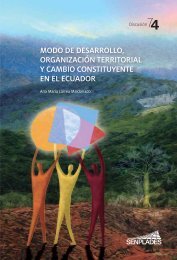1gGgw9ScK
1gGgw9ScK
1gGgw9ScK
Create successful ePaper yourself
Turn your PDF publications into a flip-book with our unique Google optimized e-Paper software.
4<br />
DOING BUSINESS 2014<br />
to the frontier—or best practice—in the<br />
area of starting a business. And they are<br />
furthest from the frontier on average in<br />
resolving insolvency. Starting a business<br />
is also the area where all regions<br />
are closest together, in line with the evidence<br />
on convergence presented later in<br />
the overview. Performance in such areas<br />
as getting credit, enforcing contracts and<br />
resolving insolvency varies considerably<br />
across regions.<br />
Across most areas measured by Doing<br />
Business, OECD high-income economies<br />
are closer to the frontier on average than<br />
those of any other region (figure 1.2). The<br />
exceptions are starting a business and<br />
registering property, where Europe and<br />
Central Asia is slightly ahead. Sub-Saharan<br />
African economies are furthest from<br />
the frontier on average in 6 of the 10 areas<br />
measured by Doing Business: starting a<br />
business, getting electricity, paying taxes,<br />
trading across borders, protecting investors<br />
and resolving insolvency<br />
FIGURE 1.2 OECD high-income economies are closest to the frontier in regulatory practice<br />
Average distance to frontier<br />
(percentage points)<br />
100<br />
90<br />
80<br />
70<br />
60<br />
50<br />
40<br />
30<br />
20<br />
Starting a business<br />
Dealing with<br />
construction permits<br />
Getting electricity<br />
Registering property<br />
OECD high income<br />
Middle East & North Africa<br />
Sub-Saharan Africa<br />
Source: Doing Business database.<br />
Paying taxes<br />
Trading across borders<br />
Getting credit<br />
Europe & Central Asia<br />
East Asia & Pacific<br />
Enforcing contracts<br />
Regulatory frontier<br />
Protecting investors<br />
South Asia<br />
Resolving insolvency<br />
Latin America & Caribbean<br />
Regional performance varies considerably<br />
across the areas measured by Doing Business.<br />
In several areas Europe and Central<br />
Asia has an average performance similar<br />
to that of OECD high-income economies.<br />
But in dealing with construction permits<br />
this region is further from the regulatory<br />
frontier than any other. East Asia and the<br />
Pacific follows Europe and Central Asia<br />
closely in some areas but outperforms<br />
that region in dealing with construction<br />
permits, getting electricity, paying taxes<br />
and trading across borders. Latin America<br />
and the Caribbean has a performance remarkably<br />
similar to that of East Asia and<br />
the Pacific except in paying taxes.<br />
The Middle East and North Africa has<br />
a very diverse performance. In some areas,<br />
such as paying taxes, it is almost as<br />
close to the frontier as OECD high-income<br />
economies. In other areas, such<br />
as getting credit, the Middle East and<br />
North Africa has the lowest performance<br />
among regions. South Asia has a gap with<br />
the frontier similar to that of Sub-Saharan<br />
Africa in most areas, though it substantially<br />
outperforms that region in 3 areas—<br />
starting a business, resolving insolvency<br />
and getting credit.<br />
The distance to frontier measure provides<br />
one perspective on variation in<br />
performance across areas of regulation<br />
measured by Doing Business. Rankings of<br />
economies in these areas provide another.<br />
The ease of doing business ranking is<br />
just one number—aggregating an average<br />
of more than 300 data points for each<br />
economy. Not surprisingly, the full set<br />
of rankings and data across Doing Business<br />
topics for an economy can present<br />
a very different picture than the aggregate<br />
ranking (figure 1.3). Take Estonia, which<br />
stands at 22 in the ease of doing business<br />
ranking. Its rankings on individual topics<br />
range from 7 in trading across borders<br />
to 68 in protecting investors. Japan’s lowest<br />
3 rankings (in paying taxes, starting a<br />
business and dealing with construction<br />
permits) average 117, while its highest 3 (in<br />
resolving insolvency, protecting investors<br />
and trading across borders) average 13. Japan’s<br />
ranking on the overall ease of doing<br />
business is 27. Three economies added to<br />
the Doing Business sample this year—Libya,<br />
Myanmar and South Sudan—show<br />
similar variation across topics (box 1.1).<br />
This variation can point to important regulatory<br />
obstacles for firms. An economy<br />
may make it easy to start a business, for<br />
example. But if getting financing is difficult,<br />
the constraints will hamper the<br />
growth of new firms, discouraging entrepreneurship.<br />
WHAT IS THE BIGGER PICTURE?<br />
Doing Business recognizes that the state<br />
plays a fundamental role in private sector<br />
development. Governments support<br />
economic activity by establishing and<br />
enforcing rules that clarify property rights<br />
and reduce the cost of resolving disputes,<br />
that increase the predictability of economic<br />
interactions and that provide contractual<br />
partners with core protections<br />
against abuse. So it is no surprise to find<br />
that there is no evidence suggesting that<br />
economies that do well on Doing Business<br />
indicators tend to have governments driven<br />
by a “smaller government” philosophy.<br />
Indeed, the data suggest otherwise. It is<br />
generally the bigger governments (as<br />
measured by government consumption<br />
expenditure as a percentage of GDP), not<br />
the small ones, that tend to provide more<br />
of the protections and efficient rules promoted<br />
by Doing Business.<br />
Economies performing well on Doing<br />
Business indicators include examples<br />
with large governments as well as those



